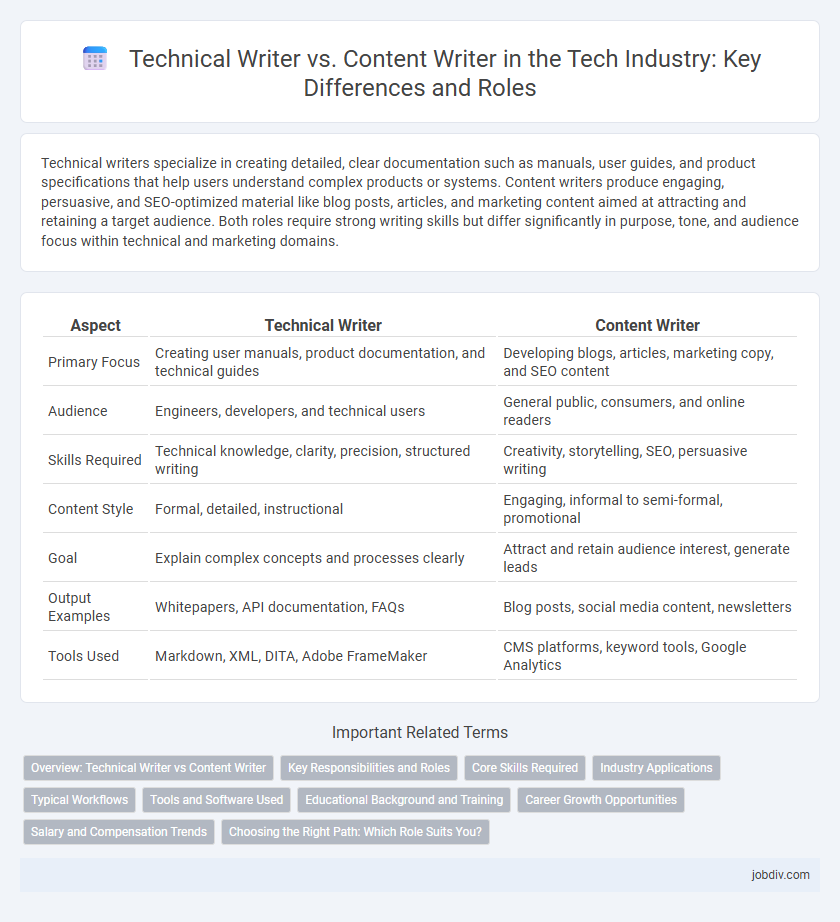Technical writers specialize in creating detailed, clear documentation such as manuals, user guides, and product specifications that help users understand complex products or systems. Content writers produce engaging, persuasive, and SEO-optimized material like blog posts, articles, and marketing content aimed at attracting and retaining a target audience. Both roles require strong writing skills but differ significantly in purpose, tone, and audience focus within technical and marketing domains.
Table of Comparison
| Aspect | Technical Writer | Content Writer |
|---|---|---|
| Primary Focus | Creating user manuals, product documentation, and technical guides | Developing blogs, articles, marketing copy, and SEO content |
| Audience | Engineers, developers, and technical users | General public, consumers, and online readers |
| Skills Required | Technical knowledge, clarity, precision, structured writing | Creativity, storytelling, SEO, persuasive writing |
| Content Style | Formal, detailed, instructional | Engaging, informal to semi-formal, promotional |
| Goal | Explain complex concepts and processes clearly | Attract and retain audience interest, generate leads |
| Output Examples | Whitepapers, API documentation, FAQs | Blog posts, social media content, newsletters |
| Tools Used | Markdown, XML, DITA, Adobe FrameMaker | CMS platforms, keyword tools, Google Analytics |
Overview: Technical Writer vs Content Writer
Technical writers specialize in creating clear, precise documentation such as manuals, user guides, and specifications that facilitate user understanding of complex products or systems. Content writers focus on producing engaging, informative articles, blog posts, and marketing materials aimed at attracting and retaining target audiences. Both roles require strong writing skills, but technical writers emphasize accuracy and clarity in technical contexts, while content writers prioritize storytelling and audience engagement.
Key Responsibilities and Roles
Technical writers specialize in creating detailed manuals, product documentation, and user guides that explain complex technical information clearly and accurately. Content writers focus on producing engaging articles, blog posts, marketing materials, and social media content aimed at audience engagement and brand promotion. Key responsibilities of technical writers include drafting precise instructions and ensuring technical accuracy, while content writers prioritize storytelling, SEO optimization, and audience targeting.
Core Skills Required
Technical writers excel in transforming complex technical information into clear, concise documentation, requiring expertise in technical subject matter, strong research skills, and proficiency with tools like XML, Markdown, and content management systems. Content writers prioritize engaging, SEO-optimized copy, demanding creativity, keyword research, and adaptability across formats such as blogs, social media, and marketing materials. Both roles necessitate excellent writing skills, but technical writing demands deeper analytical abilities and precision for user manuals, white papers, and product documentation.
Industry Applications
Technical writers specialize in creating detailed manuals, product specifications, and user guides primarily for industries like software, engineering, healthcare, and manufacturing where precise instructions and clarity are critical. Content writers produce engaging articles, blog posts, and marketing materials tailored for digital marketing, e-commerce, media, and entertainment sectors, focusing on brand awareness and audience engagement. Both roles require industry-specific knowledge, but technical writing demands a deeper understanding of complex concepts and regulatory standards.
Typical Workflows
Technical writers follow structured workflows that prioritize accuracy and clarity, often collaborating closely with subject matter experts to produce manuals, product documentation, and process guides. Content writers typically employ flexible workflows centered on research, audience engagement, and SEO optimization to create blog posts, articles, and marketing copy. Both roles require version control and iterative editing, but technical writing emphasizes compliance and detail, whereas content writing focuses on storytelling and brand voice.
Tools and Software Used
Technical writers predominantly use specialized tools such as MadCap Flare, Adobe FrameMaker, and Microsoft Visio to create structured documents, manuals, and diagrams with precision. Content writers rely heavily on content management systems (CMS) like WordPress, SEO tools such as SEMrush or Ahrefs, and writing assistants including Grammarly to optimize readability and search engine performance. Both roles utilize collaboration platforms like Google Docs and Trello, but their core software reflects the unique demands of precise technical documentation versus engaging digital content creation.
Educational Background and Training
Technical writers typically hold degrees in fields such as engineering, computer science, or communications, with specialized training in technical writing and documentation processes. Content writers often possess diverse educational backgrounds, including journalism, marketing, or English, emphasizing creative and persuasive writing skills. Training for technical writers includes proficiency in tools like XML, CSS, and API documentation, while content writers focus on SEO strategies, content management systems, and audience engagement techniques.
Career Growth Opportunities
Technical writers often experience accelerated career growth due to specialized skills in creating complex documentation for industries like software development, engineering, and healthcare. Content writers typically expand their careers by diversifying into digital marketing, SEO, and brand storytelling roles, leveraging content strategy and audience engagement expertise. The demand for technical writers is projected to grow 7% by 2030 according to the U.S. Bureau of Labor Statistics, indicating strong long-term career prospects.
Salary and Compensation Trends
Technical writers typically command higher salaries than content writers due to their specialized expertise in producing detailed manuals, product documentation, and technical reports. According to recent industry data, the median annual salary for technical writers ranges from $65,000 to $85,000, while content writers often earn between $45,000 and $60,000, reflecting the demand for precision and technical knowledge. Compensation trends indicate that companies investing in technical documentation assign premium pay rates, boosted further by skills in software tools, coding knowledge, and certifications.
Choosing the Right Path: Which Role Suits You?
Technical writers excel at creating clear, concise manuals, guides, and documentation that explain complex products or processes, making them ideal for those with strong analytical and structured communication skills. Content writers focus on crafting engaging articles, blog posts, and marketing copy aimed at attracting and retaining audiences, best suited for individuals with creativity and storytelling abilities. Choosing the right path depends on your preference for technical accuracy and detail versus persuasive and conversational writing styles.
Technical Writer vs Content Writer Infographic

 jobdiv.com
jobdiv.com